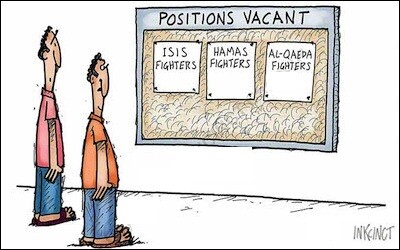Originally published under the title “Trump Knows Why People Become Jihadists.”
In Riyadh last month, US President Donald Trump broke from the usual script of an American president addressing a Muslim audience. Predictably, he urged the assembled leadership of the Muslim world to fight terrorism, but he also named “the ideology that drives it.”
Revealing a canny understanding of the lure of martyrdom and the myths of Islamic paradise, Trump boldly urged Muslim religious leaders to preach a clear message: “If you choose the path of terror, your life will be empty, your life will be brief, and your soul will be fully condemned.”
This flies in the face of the media-Hollywood belief that US foreign policy and Western culture cause terrorism, and the dominant view in academia that suicide terrorism is unrelated to Islam. Terrorists are often quite candid about why they are fighting us, yet we continue to search for “the root causes that lead people to join these groups,” as president Barack Obama’s State Department spokesperson Marie Harf phrased it.. Harf offered “lack of opportunity for jobs” as one of those root causes.
Proponents of this view recently celebrated “scientific proof” for their assertions.
Zuri Linetsky and his colleagues at the polling agency ORB International have studied the Nigerian Al-Qaeda franchise-turned-ISIS-affiliate Boko Haram and concluded that “religious identification tells us little about whether an individual is likely to sympathize with extremists, [but] employment status tells us a lot.”
Poverty and lack of education are not major drivers of terrorism.
Linetsky asserts that “survey data collected in the three Nigerian states most affected by Boko Haram (Borno, Adamawa, and Yobe) show that Islam is not a major factor in motivating recruits. Unemployment, not religiosity, is the best predictor of support for the terrorist group.”
Linetsky’s argument fails to examine the circumstances that enabled Boko Haram to come into existence and allow it to endure. For not all of Nigeria has the same problem – Boko Haram’s recruits come only from the North, where the population is mostly Muslim and where 12 states have adopted Sharia law. Linetsky might consider studying the connection between lack of job opportunities and imposition of Sharia law. In Afghanistan, the Taliban’s 1996 imposition of Sharia law ended all job opportunities for all women, none of whom joined the Taliban.
While unemployment is no doubt a factor in some individuals’ motivations to join terrorist groups, the conventional wisdom that terrorism is caused by poverty and a lack of education was statistically dismantled by Marc Sageman in Understanding Terrorist Networks (2004). But the theory never really passed the sniff test for informed and objective observers given the plethora of wealthy engineers, physicians and scholars (and the dearth of goatherds) populating the terrorism hall of fame, as well as the readily observable infrequency of terrorism in most of the world’s poorest and least-educated countries. There are no Islamic State (ISIS) attachments or al-Qaida franchises in the Congo, Mozambique, Malawi, Burundi or Liberia, where unemployment is comparable to Nigeria.
Somalia has a long history of poverty and unemployment, far worse than Nigeria’s, but there was no terrorism emanating from Somalia until Osama bin-Laden moved to the Sudan in 1991 and made partnerships with Somali warlords, such as Mohammad Farah Aidid, made infamous in the1993 raid leading to the events described in the Black Hawk Down book and film.
Linetsky equates terrorism with crime and conflates violent offensive jihad with other violent crimes like theft, muggings and gang-related turf wars. A case of adolescent ennui might lead an otherwise fine young lad to become a drug-runner, purse-snatcher or small time street thug, but boredom never turned anyone into a suicide bomber.
Only by subverting the theological equation of martyrdom with paradise can we stop the global suicide bomber epidemic.
Linetsky’s solution to Nigeria’s Boko Haram problem is not to address the repressive ideology it feeds off of, nor is it to kill its soldiers. He is a proponent of USAID “soft power” by way of “development projects, job training, educational programming, and dispute resolution programs.” But Boko Haram isn’t waging jihad against infidels because the Nigerian government and ours fail to provide them with good opportunities to work.
Rather than distributing aid to potential terrorist recruits, the West should devote its efforts to understanding and combating the ideology that attracts the recruits and defeating the organizations that disseminate it.
Trump got it exactly right – only by subverting the theological equation of martyrdom with paradise can we stop the global suicide bomber epidemic.








